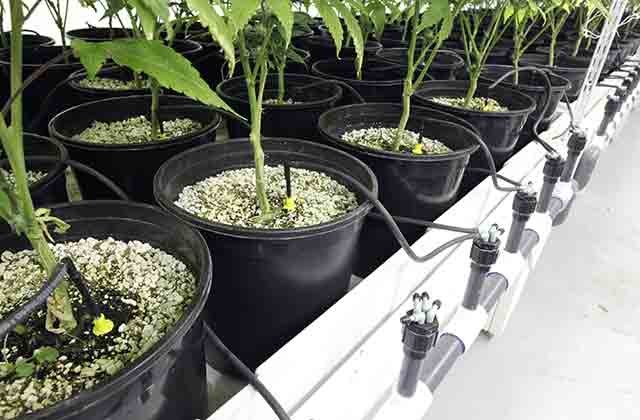Soil, Soilless or Hydro What s best for me

The way soil retains moisture for days on end means that you can leave your garden for a weekend trip without worrying about a hydro pump going out and ruining your crop. In the height of the flower cycle, when the plant is growing and consuming the most water and nutrients, I usually only need to water every 4-5 days using 3-10 gallon pots.
Many growers including myself believe that soil, especially all organic soil, and nutrients, produces the best tasting buds. With the right organic nutrients, soilless mixtures can produce very tasty buds as well but lack some of the forgiveness that soil offers beginners.
Soilless mediums such as coco, peat, and bark, are quickly becoming the most popular methods for growing marijuana these days. There are a few reasons for this:
1. A soilless mix, by design, provides no inherent nutrient value to the plant. This means that, unlike soil that comes out of the bag with nutrients built in, the soilless medium has nothing in it to help the plant grow.
So to support the plant’s growth, you are in charge of feeding it everything it will get. This gives a grower incredible control over the kind and quantity of nutrients the plant receives.
Not having these built-in nutrients also means that the pH of the medium is very consistent, furthering the grower’s control over all aspects of the growing cycle.
While this is a great feature for experienced growers, it can also be a big problem for beginners. You have to feed the plant from the first day, otherwise you could kill it or see almost no growth. Providing a marijuana plant every single nutrient it needs for maximum growth can be a daunting task. Without the buffer of soil, overloading the plant with nutrients is very easy and can cause nutrient burn and unneeded stress on the plant.
2. Marijuana plant roots are happiest in a medium that allows them lots of air. This means a growing medium that has low water retention is usually best. Soil straight out of a bag is going to have a much higher water retention than almost all soilless media.
Growers often mix in other things such as perlite in an attempt to help the water drain from the soil more quickly and allow more air to reach the roots. This is why, when using soil mixes, you don’t water as soon as the top of the soil is dry, as many do with common household plants.
Soilless mixes by design drain very quickly and, therefore, can promote faster and more vigorous growth from marijuana, especially in a high-performance indoor grow environment.
3. This low water retention means that we can water the plant, and therefore feed the plant, more often throughout its lifecycle. If you were growing in normal soil that hadn’t been modified with the addition of something like perlite, your plants would suffer if you watered them as often as you did in a soilless mix.
This also comes back to benefit us at the end of the lifecycle of the plant, in the weeks before harvest, as we flush all of the chemicals and fertilizers from the plant to produce that extra smooth smoke.
Let’s look at an example. Let’s say you take two clones from the same mother plant and grow them next to each other, one in soil and one in a soilless medium, in an attempt to make a direct comparison. Since the soilless plant would dry out faster and need more water, in an 8 week flowering cycle you might water the soilless plant anywhere from 5-10 times more than the soil plant.
This ultimately translates into more feedings of nutrients which increases growth for the soilless plant. This also means that if you are going to flush the plant before harvest (which you must do for good smoke), you would flush the soil plant for two weeks, while only needing to flush the soilless plant for 8-10 days to achieve the same results from flushing.
This time saved before flushing results in even more feedings of the soilless plant while she is packing on the most weight (in the last two weeks of the flowering phase). The longer you can continue to feed the plant the nutrients it wants, the more bud you will produce while still having the time to flush the plant properly to harvest the smoothest smoke.
Here is a common DWC (Deep Water Culture) Hydroponics system
While many might consider soilless mixes to be a hydroponic system, I am not one of them. To me, true hydroponics involves the plant’s roots being exposed to water and air, not growing in a solid medium. These types of systems come in many different varieties, but for the most part they have a few common characteristics.
They generally will all have a nutrient reservoir where the nutrients and water are combined to form a feeding solution that the plants are fed either constantly or multiple times a day.
They will also have a dark reservoir or some kind of light-tight space for the plant roots to live, as roots will have a hard time growing with constant light exposure. Just think about nature, how often are roots exposed to sunlight?